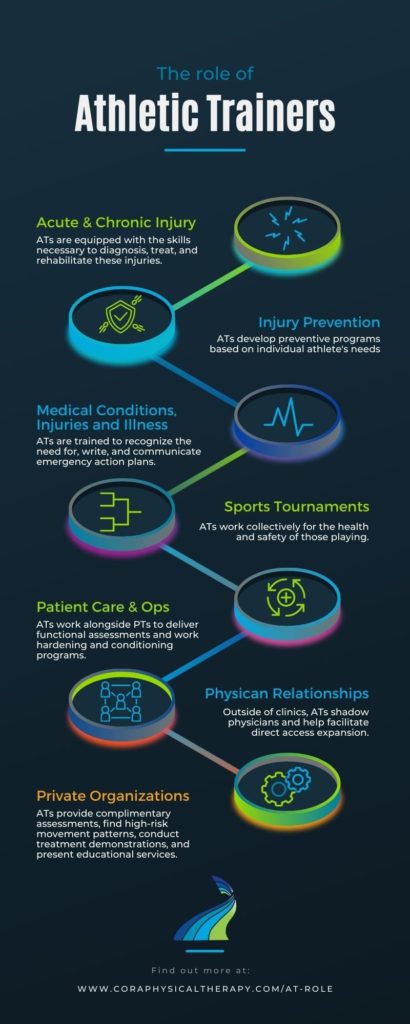
A day in the life of a high school athletic trainer
Each day the high school dismissal bell rings at 2:10 PM. Some students go home or to a friend’s house. Other students head to the field house to change for afternoon practice. Here you will find Nancy.

Nancy is a member of CORA Physical Therapy’s ActiveTracks team. She arrives at 1:00 PM and gets to work:
- Filling coolers with ice and water
- Restocking the medical kit
- Writing injury reports
- Preparing the day’s practice and game schedule
“Hey, Ms. Nancy.” Says the first to walk through the athletic training room door. More athletes follow in quick succession. They sing a “Hey, Ms. Nancy” chorus, signaling Nancy it is time to go to work.
Sparing no time, Nancy has already:
- Wrapped two thighs and one shoulder
- Adjusted one knee brace
- Covered four wounds
- Taped a multitude of ankles, wrists, thumbs, and arches
With each student-athlete, Nancy determines their return-to-play status by assessing, testing, and passing clinical judgement.
- The lacrosse player is strong enough to begin shoulder strengthening exercises.
- The football player can return now that the stitches have been removed from his left eyebrow.
- The baseball pitcher’s medial right elbow is strong but tender. Nancy will talk to the coach about modifying his activity level.
- The javelin throwers wrist is getting better but still needs taping.
- The right knee of the soccer player is still swollen and painful after last night’s game.
Nancy makes a note to call the parents of the soccer player experiencing swelling and pain in her right knee. She will help them understand the referral process for the school’s team physician.
A football player brings in x-rays of his left foot. They show no signs of fracture. He is cleared to play but with restrictions.
The large abrasion on the softball player’s right shin is healing well and shows no sign of infection.
Finally, a volleyball player provides an update on her recovery from a severe quad strain. She tells Nancy “Hi” from her CORA physical therapist.
Are Athletic Trainers Licensed, Certified?
In the US, states have varying requirements including – certification, registration, and licensure.
Athletic Trainers must graduate with a bachelor’s degree or master’s degree from an accredited program.
Nancy is state licensed and a certified athletic trainer (AT) through the Board of Certification. She is a recognized allied healthcare professional by the American Medical Association.
What Services do Athletic Trainers Provide?
All ATs are equipped with the skills necessary to diagnosis, treat, and rehabilitate acute or chronic muscle and skeletal injuries. The practice of athletic training also includes injury prevention.
ATs are trained to recognize general medical conditions, injuries and illness. They also possess the unique ability to write and communicate emergency action plans. Emergent care may include:
- Heat related injuries
- Inclement weather
- Life or limb threatening conditions
The ATs of ActiveTracks also work alongside athletic departments at colleges and universities. Here they deliver sports medicine services on varsity athletes.
Athletic trainers provide coverage at large-scale youth tournaments by working collectively for the health and safety of those playing. When inclement weather threatens outdoor activity, it is the ATs who determine when participants should leave the field and when they can return.
For those gut-wrenching, heart-stopping moments when an injured player lies motionless on the field, it is our ATs who respond first. The decision to call for emergency medical rests on their shoulders.
When emergency technicians arrive, they work in concert to stabilize that athlete. The AT will provide hands-on support by removing equipment, bracing fractured limbs, or aiding with CPR and rescue breathing.
The impact of the work by ActiveTrack’s ATs is vast. Reaching beyond baseball diamonds, football fields, rugby pitches, basketball and tennis courts.
Within CORA Physical Therapy clinics, they help patient care and operations. An AT will work alongside Physical Therapists delivering functional assessments and work hardening and conditioning programs.
Outside of the clinics, they are shadowing physicians and help facilitate direct access expansion. They collaborate with private organizations to provide complimentary assessments, find high-risk movement patterns, conduct treatment demonstrations, and present educational services.

What is ActiveTracks?
The ActiveTracks program serves a broad community and is committed to keeping you in the game.
Our team of allied healthcare providers brings evidence-based clinical and rehabilitative practices to all populations.
As an extension of CORA’s outpatient services, ActiveTracks delivers comprehensive care through outreach, education, and visibility.